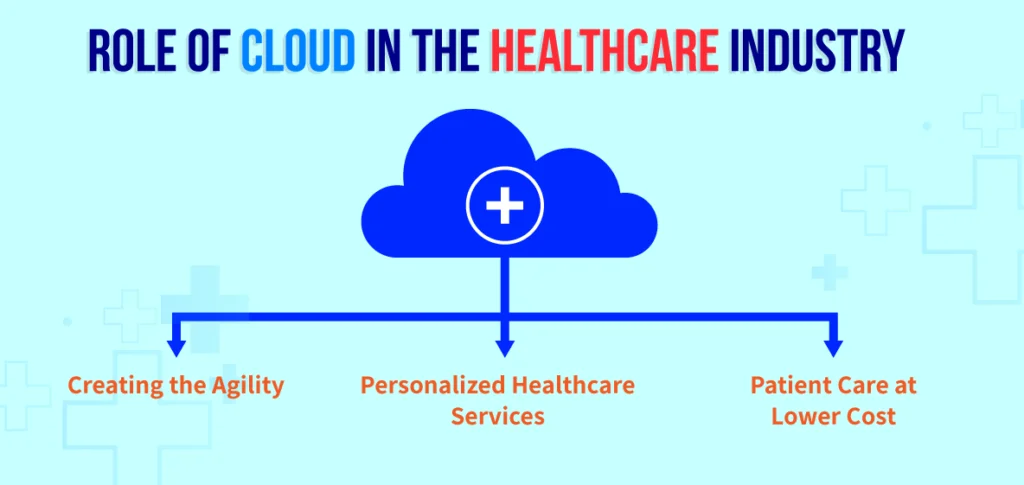Blog
What is the Future of the Healthcare Industry in the Cloud?
2020 was a year of change, crucial, but it pushed the world to do things that it might not have done otherwise. The use of technology to enhance the existing infrastructure in every industry is a leading example of the same. Sectors like healthcare needed immediate response and enhancement led by technology. One such advancement is using cloud computing in the healthcare industry to address its existing problems.
The pandemic swept away old constraints making the digital health innovators rush in. This global crisis also made service providers and technologists work tirelessly to make healthcare better while pushing a chance to save lives. Collecting and sharing data using the cloud can help the healthcare system become fit for the 21st century and the troubles it would bring upon the world.
Importance of Cloud in Healthcare Industry
It becomes even more crucial to adopt technologies like cloud computing when there are several concerns about security, legal compliance, and potential downtime while dealing with the most sensitive, personal data. Currently, we need secure and reliable virtual access to healthcare professionals.
Migration to cloud computing is a step-change for the way the healthcare industry sources its information technology (IT). The healthcare industry’s technology infrastructure and systems are traditionally highly-fragmented across the industry and they have been managed by in-house staff behind strong firewalls. It reflects a combination of piecemeal and bespoke development along with many concerns over data security. Hence, the industry needs to harness the cost and agility benefits of the cloud without compromising data security.
Role of Cloud in the Healthcare Industry
1. Creating the Agility
Widening access to healthcare across the globe—especially when we face added momentum in emerging markets by rising wealth, and in countries such as the U.S. by government health reforms—requires companies to have greater agility so that they can adapt to change at high speed and low cost.
The technology will allow the healthcare service providers to expand their business models while collaborating at low cost and high speed, facilitating them to meet changing regulations to deliver better patient services, eventually.

2. Personalized Healthcare Services
With EHRs gathering momentum, the cloud brings the prospect of patients’ digitized health information, such as medical histories, scan images, blood types, allergies, etc. It is free-flowing and accessible via secure authentication to people who are authorized by the patient. It helps them ensure seamless, personalized healthcare through ubiquitous and secure data sharing, from anywhere in the world.
Also, the ability to share medical data securely on cloud platforms via any device can have a transformative impact on personal healthcare if it’s coupled with the ubiquitous uptake of mobile devices and rising adoption of bring-your-own-device (BYOD) working practices.
3. Patient Care at Lower Cost
In developed countries like the USA, almost 80% of healthcare costs are generated as a result of care for chronic, rather than acute conditions. The major reason for the same is that the “site of care” is often a hospital or other care centre, which increases the total cost since all the related premises and services costs get added in the end.
Cloud solutions will allow healthcare providers to place remote mobile diagnostic devices in patients’ homes. All of these devices will be linked to cloud platforms, allowing the doctors to monitor them continually while offering several applications like cloud-based predictive analytics. Shifting the locus of chronic healthcare, from the hospital or clinic to the home, will help them deliver better patient care and comfort at a lower cost.
Future of Healthcare Industry with Cloud
In addition to the above use cases, cloud computing can also be harnessed to analyse health and non-health “big data”, including social media. It will help the healthcare service providers to improve public health through preventative well-being monitoring while encouraging healthier lifestyles. It will act as a key factor in transforming access to health services in emerging markets without needing any heavy investment in physical hospitals and clinical centres.
The migration of the healthcare industry to the cloud is inevitable and it will be driven by an irresistible blend of competitive realities and patient demand. Early adopters are more likely to reap the lion’s share of the benefits in any step-change in business or technology. The time is now for healthcare organizations to embrace cloud computing, and if they make a move now, it will ensure that when the game changes, it does so in their favour.
FAQs
A healthcare cloud is a cloud computing service that the healthcare service providers use to store, maintain, and back up personal health information (PHI).
Cloud computing can help the healthcare industry to increase its efficiency while decreasing costs and making it easier to share medical records securely. It can also help automate backend operations and facilitate the creation and maintenance of telehealth apps.
Cloud computing has opened gates to simpler alternatives for patient care, such as allowing the doctors to treat them remotely by automating backups and offering disaster recovery options, which is the need of the hour. Also, in case of a breach, healthcare providers won’t lose any data and will be able to minimize the downtime for their staff.
